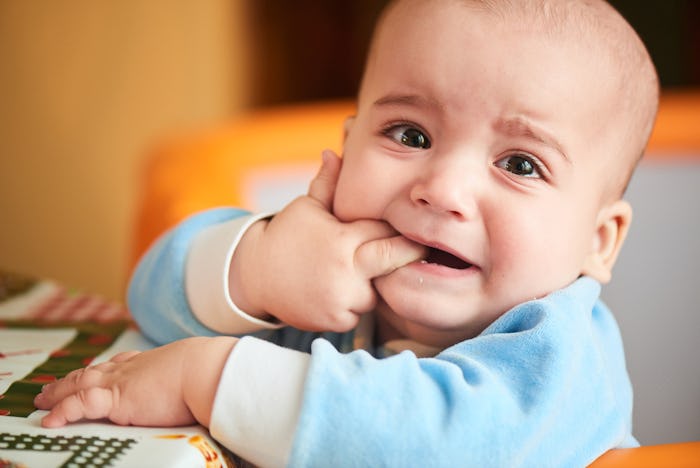Life

Here's When Your Baby Starts Teething
Babies are born with an adorable gummy smile. For most parents (especially breastfeeding moms), that early absence of teeth is a good thing. But once your newborn starts growing up, you probably wonder when do babies start teething.
As with almost everything related to babies, there is a bit of variation when it comes to teething timelines. In general, though, most babies start teething at 6 months of age, as noted in WebMD. But if your baby isn't teething at the 6 month mark exactly, you don't need to fret. As further explained in WebMD, normal teething can begin as early as 3 months, or as late as 12 months of age. Basically, your babies' dental development can have a wide range of variation.
With that in mind, it's smart to be on the lookout for the signs of teething once your baby is a few months old. Common teething signs include drooling, visible teeth, and a tendency to gnaw on everything, according to Baby Center. However, as with almost everything else related to babies, the signs may vary from child to child. One kid may react to teething by having trouble sleeping, whereas another may get fussy for no apparent reason, as further explained by Baby Center. Sometimes, babies just like to keep you guessing.
When your little one is definitely getting those teeth in, then you'll probably want to know how to soothe teething pains. After all, having teeth emerge from your gums just sounds unpleasant. Thankfully, there are many tricks you can use to help your baby out. According to Healthline, ice is a great way to bring relief to teething babies. A frozen washcloth, bagel, or teething ring can offer your baby a lot of comfort. With a little trial and effort, you can find the solution that works best for your baby.
Whether your baby is 3 months old or closer to the year mark when teething starts, you're probably in the clear. By being mindful of the teething signs and helping out your little one if the pain gets too rough, you can both get through this milestone with little trouble. As always, if anything about your child's teething seems amiss, then don't hesitate to discuss your concerns with a pediatrician. In the meantime, enjoy your baby's dental journey.
This article was originally published on